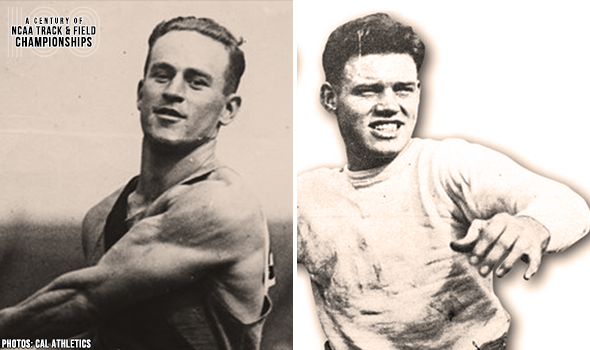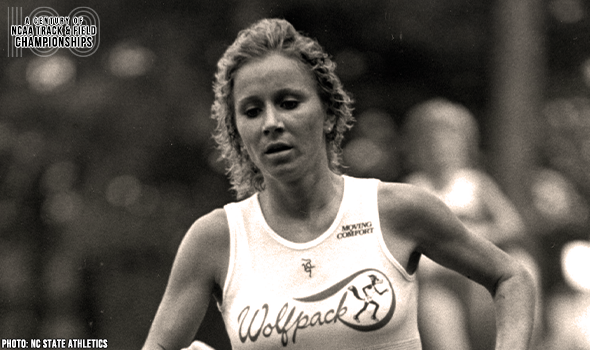
Ellerbe Won After Film Review In 1939
How close was the 100-yard final at the 1939 NCAA Outdoor Track & Field Championships?
It required a closer look – sort of a photo-finish, except motion pictures were used.
Unfortunately it wasn’t a quick process as the film had to be developed, so the announced results of Stanford’s Clyde Jeffrey winning over defending champion Mozelle Ellerbe of Tuskegee stood until the film could be reviewed, which occurred after the meet was over.
Meet judges and meet referee Amos Alonzo Stagg – who chaired the committee for the first NCAA meet in 1921 – came to the conclusion that it was Ellerbe who had actually won by about 3 inches, both being timed in 9.8.
The reversal meant Ellerbe was not only the fifth man to repeat as 100-yard/meter champion, but the first athlete to repeat in any event from a predominantly black school. Ellerbe’s first NCAA win at the 1938 meet in Minneapolis was also close, but film review wasn’t necessary.
It wasn’t the last time Ellerbe and Jeffrey had a close finish. Three weeks later at the AAU national championships the two tied in a 100-meter heat at a wind-aided 10.2, the same time as Jesse Owens’ world record. Jeffrey won the final later in the day with another wind-aided 10.2 as Ellerbe finished fourth.
The NCAA and collegiate track & field will mark a momentous milestone in the spring of 2021 -- the 100th anniversary of the NCAA Championships and with that, the NCAA Track & Field Championships. In June 1921, the University of Chicago hosted the first track & field championships in NCAA history.
This point can’t be emphasized enough: Not only was the event the first for NCAA track & field, but the first championships for any sport under the sponsorship of the NCAA.
To celebrate, over each of the next 365 days, the U.S. Track & Field and Cross Country Coaches Association (USTFCCCA) will celebrate moments, student-athletes, and coaches that have made a century’s worth of championships special. From humble beginnings to important historical milestones to the modern-day, collegiate track & field has evolved with the American society.
The 2021 edition of the NCAA Division I Outdoor Track & Field Championships begin with preliminary round action on May 27-29 in Jacksonville, Fla., and College Station, Texas. The championships final site and culmination of the celebration is slated for June 9-12, 2021 at the newly rebuilt Hayward Field in Eugene, Ore.

Merchant, Muller Led Cal’s Field Day In 1922
Jack Merchant and Harold Muller combined for six top-5 finishes in five field events at the 1922 NCAA Outdoor Track & Field Championships.

NC State’s Springs Doubles Up Distance Titles
In 1983, Betty Springs became the first woman in the history of the NCAA Division I Outdoor Track & Field Championships to sweep the 5K/10K titles.

“Marvelous Mal” Whitfield Stars Over Two Laps
“Marvelous” Mal Whitfield won back-to-back NCAA 800-meter/880-yard titles in 1948 and 1949.

Ewen Was A True Triple Threat At NCAAs
Maggie Ewen is the only woman in the history of the NCAA Division I Outdoor Track & Field Championships with titles in three different throwing events.

Wanamaker Wins Inaugural Decathlon Title
Rick Wanamaker of Drake won the first-ever decathlon title at the NCAA Division I Outdoor Track & Field Championships in 1970!

SMU’s Connor Bounds To Triple Jump Greatness
It’s been 38 years and still no one has broken the meet record Keith Connor of SMU set in the triple jump at the 1982 NCAA Division I Outdoor Track & Field Championships in Provo, Utah.

Hail Lorenzo! Daniel Sprints To 200-Meter Records
Lorenzo Daniel of Mississippi State made four consecutive appearances in the final of the Men’s 200 Meters and set a collegiate and meet record in his last race.

Talented Twins Dominate Pole Vault Podium
Twin sisters Lexi Jacobus and Tori Hoggard finished on the same podium five times in eight seasons at the NCAA Championships and each won an outdoor title.

Blozis Was A “Giant” In The Shot
“Giant” Al Blozis won three consecutive shot put titles at the NCAA Outdoor Championships between 1940 and 1942.

Cameron Came Close To Standing Alone
Two one-hundredths of a second separated Bert Cameron of UTEP from standing alone in NCAA history.

